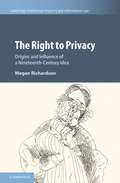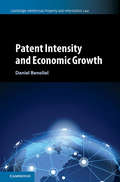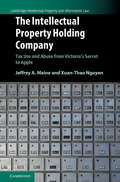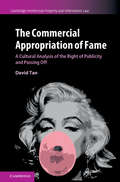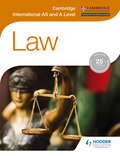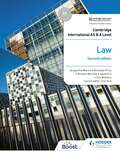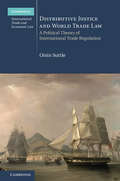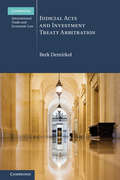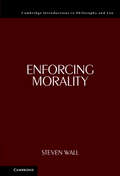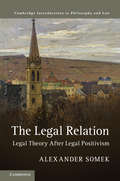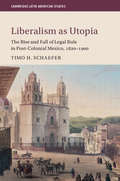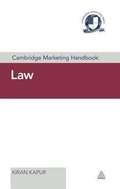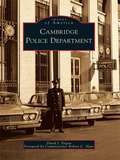- Table View
- List View
Cambridge Intellectual Property and Information Law: International Copyright and Access to Knowledge
by Sara BannermanThe principle of Access to Knowledge (A2K) has become a common reference point for a diverse set of agendas that all hope to realize technological and human potential by making knowledge more accessible. This book is a history of international copyright focused on principles of A2K and their proponents. Whilst debate and discussion so far has covered the perspectives of major western countries, the author's fresh approach to the topic considers emerging countries and NGOs, who have fought for the principles of A2K that are now fundamental to the system. Written in a clear and accessible style, the book connects copyright history to current problems, issues and events.
Cambridge Intellectual Property and Information Law: Media Freedom as a Fundamental Right
by Jan OsterDomestic constitutions and courts applying international human rights conventions acknowledge the significance of the mass media for a democratic society, not only by granting special privileges but also by imposing enhanced duties and responsibilities to journalists and media companies. However, the challenges of media convergence, media ownership concentration and the internet have led to legal uncertainty. Should media privileges be maintained, and, if so, how is 'the media' to be defined? To what extent does media freedom as a legal concept also encompass bloggers who have not undertaken journalistic education? And how can a legal distinction be drawn between investigative journalism on the one hand and reporting on purely private matters on the other? To answer these questions, Jan Oster combines doctrinal and conceptual comparative analysis with descriptive and normative theory, and argues in favour of a media freedom principle based on the significance of the media for public discourse.
Cambridge Intellectual Property and Information Law: Origins and Influence of a Nineteenth-Century Idea (Cambridge Intellectual Property and Information Law #40)
by Megan RichardsonUsing original and archival material, The Right to Privacy traces the origins and influence of the right to privacy as a social, cultural and legal idea. Richardson argues that this right had emerged as an important legal concept across a number of jurisdictions by the end of the nineteenth century, providing a basis for its recognition as a universal human right in later centuries. This book is a unique contribution to the history of the modern right to privacy. It covers the transition from Georgian to Victorian England, developments in Second Empire France, insights in the lead up to the Brgerliches Gesetzbuch (BGB) of 1896, and the experience of a rapidly modernising America around the turn of the twentieth century. It will appeal to an audience of academic and postgraduate researchers, as well as to the judiciary and legal practice.
Cambridge Intellectual Property and Information Law: Patent Intensity and Economic Growth (Cambridge Intellectual Property and Information Law #38)
by Daniel BenolielEconomic growth has traditionally been attributed to the increase in national production arising from technological innovation. Using a panel of seventy-nine countries bridging the North-South divide, Patent Intensity and Economic Growth is an important empirical study on the uncertain relationship between patents and economic growth. It considers the impact of one-size-fits-all patent policies on developing countries and their innovation-based economic growth, including those policies originating from the World Intellectual Property Organization, the World Trade Organization and the World Health Organization, as well as initiatives derived from the TRIPS Agreement and the Washington Consensus. This book argues against patent harmonization across countries and provides an analytical framework for country group coalitioning on policy at UN level. It will appeal to scholars and students of patent law, national and international policy makers, venture capitalist investors, and research and development managers, as well as researchers in intellectual property, innovation and economic growth.
Cambridge Intellectual Property and Information Law: Tax Use and Abuse from Victoria's Secret to Apple (Cambridge Intellectual Property and Information Law)
by Jeffrey A. Maine Xuan-Thao NguyenMany companies that have become household names have avoided billions in taxes by 'parking' their valuable intellectual property assets in holding companies located in tax-favored jurisdictions. In the United States, for example, many domestic companies have moved their IP to tax-favored states such as Delaware or Nevada, while multinational companies have done the same by setting up foreign subsidiaries in Ireland, Singapore, Switzerland, and the Netherlands. In this illuminating work, tax scholar Jeffrey A. Maine teams up with IP expert Xuan-Thao Nguyen to explain how the use of these IP holding companies has become economically unjustified and socially unacceptable, and how numerous calls for change have been made. This book should be read by anyone interested in how corporations - including Gore-Tex, Victoria's Secret, Sherwin-Williams, Toys-R-Us, Apple, Microsoft, and Uber - have avoided tax liability with IP holding companies and how different constituencies are working to stop them.
Cambridge Intellectual Property and Information Law: Test Tubes for Global Intellectual Property Issues
by Susy FrankelSmall market economies provide a valuable insight into how a country might balance competing interests in global intellectual property. As developed countries that are also net-importers of intellectual property, small market economies have similar concerns to some developing countries. This duality of developed and developing country interests has resulted in some innovative ways of calibrating laws so that they both support national economic and social needs and honour international commitments. In this book, Susy Frankel uses examples from the small market economies of Singapore, New Zealand and Israel to address global intellectual property issues. Those issues include approaching treaty interpretation to both assist in implementation of obligations and utilisation of flexibilities, and effective dispute resolution; the links between trade and innovation; when and how patent and copyright law can be flexible; the importance of trade marks to small businesses; parallel importing; and the protection of traditional knowledge.
Cambridge Intellectual Property and Information Law: The Commercial Appropriation of Fame
by David TanCelebrities can sell anything from cars to clothing, and we are constantly fascinated by their influence over our lifestyle choices. This book makes an important contribution to legal scholarship about the laws governing the commercial appropriation of fame. Exploring the right of publicity in the US and the passing off action in the UK and Australia, David Tan demonstrates how an appreciation of the production, circulation and consumption of fame can be incorporated into a pragmatic framework to further the understanding of the laws protecting the commercial value of the celebrity personality. Using contemporary examples such as social media and appropriation art, Tan shows how present challenges for the law may be addressed using this cultural framework. This book will be of interest to intellectual property law academics, judges, practitioners and students in the US and common law jurisdictions, as well as those in the field of cultural studies.
Cambridge Intellectual Property and Information Law: Trademark and Unfair Competition Conflicts
by Dornis Tim W.With the rise of internet marketing and e-commerce around the world, international and cross-border conflicts in trademark and unfair competition law have become increasingly important. In this groundbreaking work, Tim Dornis - who, in addition to his scholarly pursuits, has worked as an attorney, a public prosecutor, and a judge, giving him experience in both civil and common-law jurisdictions - presents the historical-comparative, doctrinal, and economic aspects of trademark and unfair competition conflicts law. The book should be read by any scholar or practitioner interested in the international aspects of intellectual property generally, and trademark and unfair competition law specifically. This title is available as Open Access.
Cambridge International AS and A Level Law
by Jacqueline MartinWe are working with Cambridge International Examinations to gain endorsement for this Student's Book, which offers content in the same order as the latest syllabus and insight from expert authors on every paper.- Ensures relevance with up-to-date case examples from around the world- Gets students focusing on key elements and thinking about Law in the right way with expert tips throughout- Prepares students for assessment with examination questions
Cambridge International AS and A Level Law Second Edition
by Jacqueline Martin Nicholas Price Richard Wortley Jayne Fry Tim WilshireWe are working with Cambridge Assessment International Education to gain endorsement for this forthcoming title. Build strong subject knowledge and skills with the only published course to offer full and comprehensive coverage of the syllabus for examination from 2023.-Engage with relevant and up-to-date case examples to illustrate key topics. - Build knowledge with key elements covered and skills-targeted activities throughout.- Test understanding with a range of activities and exam-style questions.- Extend learning with Internet research boxes providing opportunities to delve further into topics.
Cambridge International AS and A Level Law Second Edition
by Jacqueline Martin Nicholas Price Richard Wortley Jayne Fry Tim WilshireWe are working with Cambridge Assessment International Education to gain endorsement for this forthcoming title. Build strong subject knowledge and skills with the only published course to offer full and comprehensive coverage of the syllabus for examination from 2023.-Engage with relevant and up-to-date case examples to illustrate key topics. - Build knowledge with key elements covered and skills-targeted activities throughout.- Test understanding with a range of activities and exam-style questions.- Extend learning with Internet research boxes providing opportunities to delve further into topics.
Cambridge International Trade and Economic Law: A Political Theory of International Trade Regulation (Cambridge International Trade and Economic Law #36)
by Oisin SuttleWhat does justice demand in international trade regulation? And how far does World Trade Organization (WTO) law respond to those demands? Whether our focus is developing countries, struggling industries, or environmental protection, distributive conflict is a pervasive feature of international economic law. Despite this, we lack an adequate theory of distributive justice for this domain. Drawing on philosophical approaches to global justice, this book advances a novel theory of justice in trade regulation, and applies this to explain and critique the law of the WTO. Integrating theoretical and doctrinal approaches, it demonstrates the potential for political theory to illuminate and inform the progressive development of WTO law, including rules on border measures, discrimination, trade remedies and domestic regulation. Written from an interdisciplinary perspective, accessible to lawyers, philosophers and political scientists, the book will appeal both to theorists interested in building bridges from theory to practice, and practitioners seeking new perspectives on existing problems.
Cambridge International Trade and Economic Law: Developing Countries and Preferential Services Trade
by Charlotte Sieber-GasserWTO law sets the global minimum standards for trade regulation, while allowing some regulatory flexibility for developing countries. The exact scope of regulatory flexibility is often unclear and, at times, flexibility may be counterproductive to sustainable economic growth in developing countries. Undisputedly, developing countries would have some flexibility with respect to tailoring preferential services trade agreements to their individual economic needs and circumstances, but empirical data from over 280 preferential services trade agreements worldwide shows that this flexibility is rarely used. This volume clarifies the regulatory scope of flexibility for preferential services trade agreements between developing countries by linking the legal interpretation of WTO law with evidence from research in economics and political sciences. The book suggests that the current regulatory framework leaves room for meaningful flexibility for developing countries, and encourages policymakers and scholars to take these flexibilities into consideration in their design and study of trade policies.
Cambridge International Trade and Economic Law: Establishing Judicial Authority in International Economic Law
by Joanna Jemielniak Jemielniak, Joanna and Nielsen, Laura and Olsen, Henrik Palmer Laura Nielsen Henrik Palmer OlsenA central development in international law is the intensified juridification of international relations by a growing number of international courts. With this in mind, this book discusses how international judicial authority is established and managed in key fields of international economic law: trade law, investor-state arbitration and international commercial arbitration. Adopting a unique legal-centric approach, the analysis explores the interplay between these areas of economic dispute resolution, tracing their parallel developments and identifying the ways they influence each other on processual mechanisms and solutions. Drawing together contributions from many leading scholars across the world, this volume considers issues such as the usage of precedent and the role of legitimacy, suggesting that the consolidation of judicial authority is a universal trend which impacts on state behaviour.
Cambridge International Trade and Economic Law: Export Restrictions on Critical Minerals and Metals
by Ilaria EspaConventional wisdom on the insufficiency of existing WTO disciplines on export restrictions has triggered momentum on the issue. In this book, Ilaria Espa offers a comprehensive analysis of the scope and coverage of WTO disciplines on export restrictions in light of emerging case law. She investigates whether such rules still provide a sufficient, credible and effective framework capable of preventing abuses in the use of export restrictive measures on critical minerals and metals during a period of economic crisis and change in international trade patterns. Giving a broad overview of the export restrictions applied to these materials, Espa identifies distinctive features in the proliferation of export barriers and analyses the existing WTO rules to reveal their scope, gaps and inconsistencies. She goes on to present solutions based upon her findings with the aim of bringing more coherence and equity to WTO rules on the export side.
Cambridge International Trade and Economic Law: Judicial Acts and Investment Treaty Arbitration (Cambridge International Trade and Economic Law)
by Berk DemirkolJudicial acts of states are becoming increasingly subjected to international investment claims. This book focuses on distinctive particularities of these claims. Although there are no special responsibility regimes for different functions of the state, the application of investment treaty standards and the threshold for their breach may vary depending on the function involved. Accordingly, in order for the state to incur responsibility for a wrongful act committed in the exercise of its judicial function, there are some specific conditions that should be met: the investor must establish that the state is responsible for a breach attributable to the state; the investment tribunal has jurisdiction over the particular dispute; and the damage that the investor has suffered is a result of the particular breach. Berk Demirkol addresses questions in relation to the substance, jurisdiction, admissibility, and remedies in cases where state responsibility arises from a wrongful judicial act.
Cambridge International Trade and Economic Law: Optimal Regulation and the Law of International Trade
by Boris RigodAre the limitations imposed on World Trade Organization (WTO) members' right to regulate efficient? This is a question that is only scarcely, if ever, analysed in existing literature. Boris Rigod aims to provide an answer to this fundamental concern. Using the tools of economic analysis and in particular the concept of economic efficiency as a benchmark, the author states that domestic regulatory measures should only be subject to scrutiny by WTO bodies when they cause negative international externalities through terms of trade manipulations. He then suggests that WTO law, applied by the WTO judiciary can prevent WTO members from attaining optimal levels of regulation. By applying a law and economics methodology, Rigod provides an innovative solution to the problem of how to reconcile members' regulatory autonomy and WTO rules as well as offering a novel analytical framework for assessing domestic regulations in the light of WTO law.
Cambridge International Trade and Economic Law: WTO Dispute Settlement and the TRIPS Agreement
by Matthew KennedyThe TRIPS Agreement was implemented in the WTO to gain access to a functioning dispute settlement mechanism that could authorize trade sanctions. Yet TRIPS and the WTO Dispute Settlement Understanding are based on systems that developed independently in WIPO and GATT. In this book, Matthew Kennedy exposes the challenges created by the integration and independence of TRIPS within the WTO by examining how this trade organization comes to grips with intellectual property disputes. He contrasts the way intellectual property disputes between governments have been handled before and after the establishment of the WTO. Based on practical experience, this book provides a comprehensive review of the issues that arise under the DSU, TRIPS, GATT 1994 and other WTO agreements in intellectual property matters. These range from procedural pitfalls to substantive treaty interpretation and conflicts as well as remedies, including cross-retaliation.
Cambridge Introductions to Philosophy and Law: Enforcing Morality (Cambridge Introductions To Philosophy And Law Ser.)
by Steven WallCambridge Introductions to Philosophy and Law: Legal Theory after Legal Positivism (Cambridge Introductions to Philosophy and Law)
by Alexander SomekWhat is law? The usual answer is that the law is a system of norms. But this answer gives us at best half of the story. The law is a way of relating to one another. We do not do this as lovers or friends and not as people who are interested in obtaining guidance from moral insight. In a legal context, we are cast as 'character masks' (Marx), for example, as 'buyer' and 'seller' or 'landlord' and 'tenant'. We expect to have our claims respected simply because the law has given us rights. We do not want to give any other reason for our behavior than the fact that we have a legal right. Backing rights up with coercive threats indicates that we are willing to accept legal obligations unwillingly. This book offers a conceptual reconstruction of the legal relation on the basis of a critique of legal positivism.
Cambridge Latin American Studies: The Rise and Fall of Legal Rule in Post-Colonial Mexico, 1820–1900 (Cambridge Latin American Studies #106)
by Schaefer Timo H.Liberalism as Utopia challenges widespread perceptions about the weakness of Mexico's nineteenth-century state. Schaefer argues that after the War of Independence non-elite Mexicans - peasants, day laborers, artisans, local merchants - pioneered an egalitarian form of legal rule by serving in the town governments and civic militias that became the local faces of the state's coercive authority. These institutions were effective because they embodied patriarchal norms of labor and care for the family that were premised on the legal equality of male, adult citizens. The book also examines the emergence of new, illiberal norms that challenged and at the end of the century, during the dictatorship of Porfirio Daz, overwhelmed the egalitarianism of the early-republican period. By comparing the legal cultures of agricultural estates, mestizo towns and indigenous towns, Liberalism as Utopia also proposes a new way of understanding the social foundations of liberal and authoritarian pathways to state formation in the nineteenth-century world.
Cambridge Marketing Handbook: Law
by Kiran KapurMarketers should be aware that there is a large amount of regulation and legislation and that ignorance of the law is not an excuse. However, many marketers feel very unsure how the various rules and regulations affect them. This handbook examines the key issues that affect marketers in marketing communications, including both traditional media such as advertisements and social media. Written by a marketer, rather than a lawyer, this handbook is designed to give practical guidance on all the necessary aspects. Legal language is very precise, and hence complicated; this handbook uses colloquial language for clarity. Each chapter includes clear summaries, examples and flow diagrams to help marketers understand how to comply.
Cambridge Philosophy Classics: What is a Law of Nature?
by D. M. ArmstrongFirst published in 1985, D. M. Armstrong's original work on what laws of nature are has continued to be influential in the areas of metaphysics and philosophy of science. Presenting a definitive attack on the sceptical Humean view, that laws are no more than a regularity of coincidence between stances of properties, Armstrong establishes his own theory and defends it concisely and systematically against objections. Presented in a fresh twenty-first-century series livery, and including a specially commissioned preface written by Marc Lange, illuminating its continuing importance and relevance to philosophical enquiry, this influential work is available for a new generation of readers.
Cambridge Police Department (Images of America)
by David J. Degou Commissioner Robert HaasFormally organized in 1859 with the appointment of John C. Willey as the first chief of police, the Cambridge Police Department was then manned by only 16 officers. The department has grown dramatically from its humble beginnings and today employs 277 sworn officers and a civilian staff of 37. Cambridge Police Department, the first comprehensive photographic history of the department, contains over 100 years of historical photographs, including images of specialized traffic and K-9 units, auxiliary police officers, uniforms, and equipment. Many of the vintage photographs in the collection have come from the department archives or were donated by family members of Cambridge officers.
Cambridge Studies In European Law And Policy: Gendering European Working Time Regimes
by Ania ZbyszewskaThe standard approach to regulating working hours rests on gendered assumptions about how paid and unpaid work ought to be divided. In this book, Ania Zbyszewska takes a feminist, socio-legal approach to evaluate whether the contemporary European working time regimes can support a more equal sharing of this work. Focusing on the legal and political developments surrounding the EU's Working Time Directive and the reforms of Poland's Labour Code, Zbyszewska reveals that both regimes retain this traditional gender bias, and suggests the reasons for its persistence. She employs a wide range of data sources and uses the Polish case to assess the EU influence over national policy discourse and regulation, with the broader transnational policy trends also considered. This book combines legal analysis with social and political science concepts to highlight law's constitutive role and relational dimensions, and to reflect on the relationship between discursive politics and legal action.

